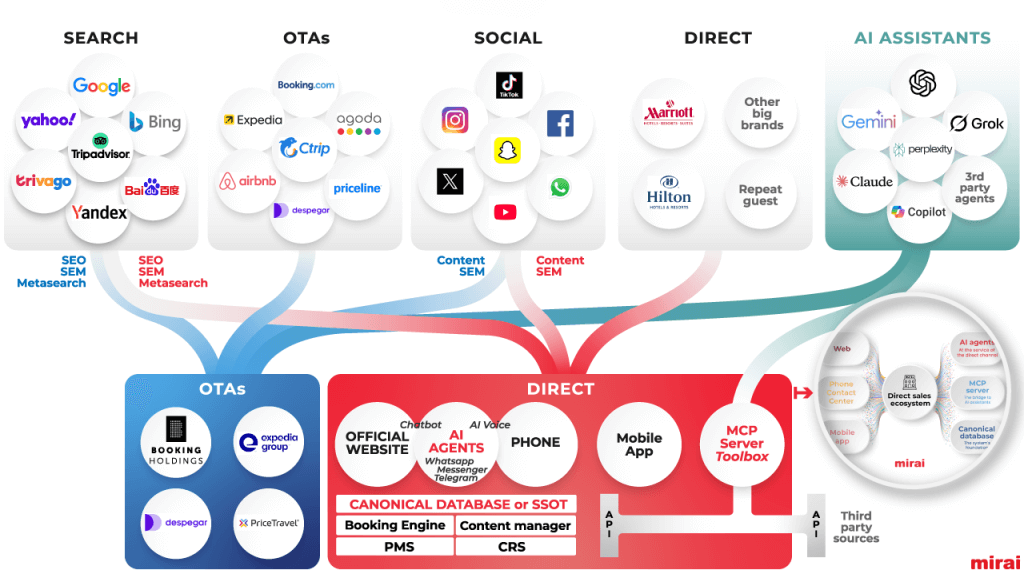In the dynamic realm of hotel management, pursuing maximum profitability is an ever-evolving challenge. Properties with a focus on touroperation often find themselves entangled in the complexities of inventory management, strategic pricing, and allotments. The intricate web of dealing with numerous touroperators, each with distinct demands, makes it a formidable task to monitor inventory, pricing strategies, and contractual obligations.
NB: This is an article from BEONx, one of our Expert Partners
Subscribe to our weekly newsletter and stay up to date
Strategic maneuvers for touroperation allotment mastery
Touroperation allotments, a prevalent practice in the hospitality landscape, involve assigning a specific number of rooms or services for touroperators who bring in sizable groups of guests. These arrangements, pre-negotiated, typically include discounts or predetermined pricing structures. This symbiotic relationship ensures a guaranteed guest count for the hotel and affords the touroperator reduced rates.
In destinations where demand is closely tied to accessibility, touroperations play a pivotal role. Offering comprehensive packages addressing transportation, accommodations, and activities, they serve as a solution to travel uncertainties. This is particularly evident in hotels focused on the leisure segment, especially in destinations where accessibility is a critical factor.
Strategic playbook for effective management
Effectively managing allotments in hotels centered around touroperators while safeguarding the transient segment requires a meticulous strategy. Here are strategic maneuvers to navigate these challenges effectively:
- Allotment boundaries: Define precise limits for touroperators based on historical data and demand forecasts, covering rooms, services, and pricing.
- Dynamic pricing mastery: Adapt touroperation rates based on occupancy levels and demand, maintaining competitiveness without compromising revenue.
- Real-time inventory control: Invest in a robust inventory management system for swift allocation and release of allotments in response to current demand.
- Release policy negotiation: Collaborate with touroperators to establish transparent release policies for unsold allotments, freeing up rooms for the transient segment.
- Demand forecast precision: Leverage demand forecasting tools to predict needs for both touroperators and transient guests, avoiding overcommitment during peak periods.
- Regular allotment agreement reviews: Periodically reassess and renegotiate allotment agreements to align with market conditions and the overarching hotel strategy.
- Performance monitoring: Continuously monitor allotment performance for both segments, utilizing data-driven insights for strategic adjustments.
- Enhanced guest experience: Strategically allocate rooms to prevent conflicts and ensure a seamless experience for all guests.
- Communication and flexibility: Maintain open lines of communication with touroperators, emphasizing flexibility while ensuring a commitment to quality service.
- Cross-segment collaborations: Explore collaborative opportunities and packages that benefit both touroperators and the transient segment, particularly during off-peak seasons.
- Online presence vigilance: Monitor online distribution channels to prevent touroperation dominance, preserving space for transient segment bookings.
- Staff training excellence: Equip staff with an understanding of the unique demands of each segment, enabling effective management of expectations.
The tech revolution in hotel management
Technological advancements are catalysts for informed decision-making in the hotel industry. Automation and streamlined processes reduce the margin for error, ensuring a seamless experience for touroperators and transient guests. Technology aids in optimizing room allotments, monitoring release dates, forecasting demand, and dynamically pricing rooms, ultimately enhancing operational efficiency and responsiveness to market conditions.
Striking a harmonious balance
Successfully navigating the delicate balance between managing touroperation allotments and safeguarding the transient segment is an intricate yet rewarding endeavor for hotels. The strategic playbook outlined and the judicious use of hotel management technology empower hotels to maintain strict control over touroperation channels. This control translates to optimized inventory, availability, and pricing, fostering a seamless and responsive experience for both touroperators and transient guests. In an industry marked by constant evolution, adaptability and innovation emerge as the keys to sustained success.





